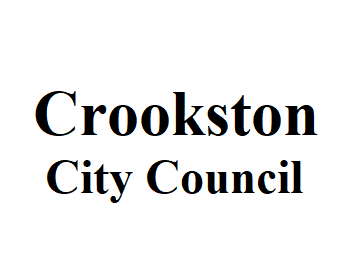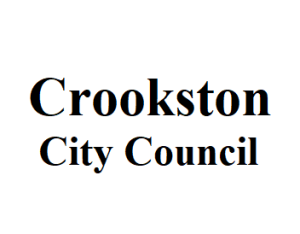The Crookston City Council met tonight at the Crookston City Council Chambers in the lower level of Crookston City Hall for a Special Meeting.
REGULAR AGENDA
The Council received a presentation by Kyle Hartnett from the League of Minnesota Cities to remind them of how the Mayor, Council members, and their staff roles relate to each other and how they can work together to further the city’s best interests with a new City Administrator.
He began by explaining that Minnesota has two types of city councils, the Statutory and the Charter. Explaining that Statutory Cities usually have the Mayor with “weak” and limited powers, and they work in conjunction with the Council and an elected or appointed clerk to pass resolutions, using their authority together as a decision-making body. In contrast, Crookston’s Council is a Charter, whose Councils are more unique to the city, usually modeled after some form of Statutory model but follows a local constitution to pass their resolutions.
He then went into the City Council’s Charter system, explaining that the Mayor’s role is being able to preside at meetings and can vote and break ties as well as invoke vetoes on ordinances and resolutions, but that they have no administrative duties. Meanwhile, the Council members have their own duties they must do in meetings, such as participating in meetings and voting on resolutions and by acting as a liaison between the city and the residents. City Managers have specific legal authorities such as enforcing statutes, ordinances and resolutions, appointing, supervising, and removing city staff, overseeing finances and the budget, and preparing administrative regulations. However, their powers are granted by statute, not by the Council. And only the voters can change that.
He then went into the role of the City Administrator, saying that it is not found in a State Statute and has been a commonly adopted position in cities that use the weak mayor-council plan. And while they have responsibilities that are similar to a City Manager, the administrative authority legally remains with the Council, but much more is delegated to the Administrator over the Manager. “One of the things that we took away is that the City Administrator is in charge of personnel, which is not an issue for individual Council members or the Council as a whole to be involved in directly.” City Administrator Interim Charles “Corky” Reynolds explained, “They should indirectly, by asking questions of the City Administrator, but should recognize that the City Administrator is charged with handling staff appropriately, as well as staffing decisions and discipline and that those types of things are not issues for individual console members.”
Hartnett then continued by going into the responsibilities of each of the staff and how they are meant to help the council members by giving them the information they need to know; such as the pros and cons of the movements they try to propose, keeping track of the finances, and present the Council Members with reasonable options for them to bring forward. “The biggest thing for them to remember is that their roles as City Council members are different from City Staff.” Minnesota Cities League Representative Kyle Hartnett explained, “They are there for the big picture ideas while the Staff is the experts that help them implement the policies and that ultimately the Staff and Council need to trust each other, and know that they’re all working toward the ultimate goal of doing what is best for the city.”
He also warned them of issues he’s seen other councils commit that cause conflicts within the Council and with the public. Such as not to overstep or confuse their roles, as this will lead to confusion on who actually makes the decision and can cause the public to feel a loss of accountability for the Council and that the Council can’t work as a team. He also recommended that they understand the laws so they don’t get misunderstood or broken by them or the citizens, as this will erode the public trust and have the public believe that they don’t have their best interests in mind. If these happen, meetings can become inefficient as nothing gets done. He also warned that Council members’ feelings could become personal if people don’t vote or agree with a motion or ordinance and warned them to consider that each member is looking to help make the city better when they make their votes.
He finished by advising them to recognize that people run for office for a reason. They’re either interested in trying to help the community and may feel that they can help do something better, or they feel something isn’t being taken care of properly. Also, newly elected officials are sometimes skeptical of the current Council and staff and advised them to help correct any misperceptions by being open and honest with them to convince them that they are just as vested in the community’s success as they are. And that the communication should be a two-way street. As if one group looks good for helping the city, they’ll all look good.
The Council was very interested in the presentation and had a couple of discussions about how they could use this new knowledge to work better with their staff and the new City Administrator. Discussing some potential traits and characteristics the new Administrator could have that could help them in certain situations. “I think the big takeaway from this is that there needs to be communication with each other on the Council at meetings but also to allow Staff the opportunity to address those concerns that we bring up at a Council meeting.” Reynolds explained, “We’ve got to give staff some time to come up with potential pros and cons of an issue that we might want, and that the Council should bring concerns to the new City Administrator and say, “I’ve got a concern on this, so could you research this and get back to me on it. And is it a concern of more than just myself and my ward, and for the whole city? And if it is, should we change that ordinance, and if so, why? Or if not, why? And are we applying that ordinance uniformly throughout the city?”
The City Council will meet again on April 5, at 4:30 p.m., for another Special City Council meeting.





